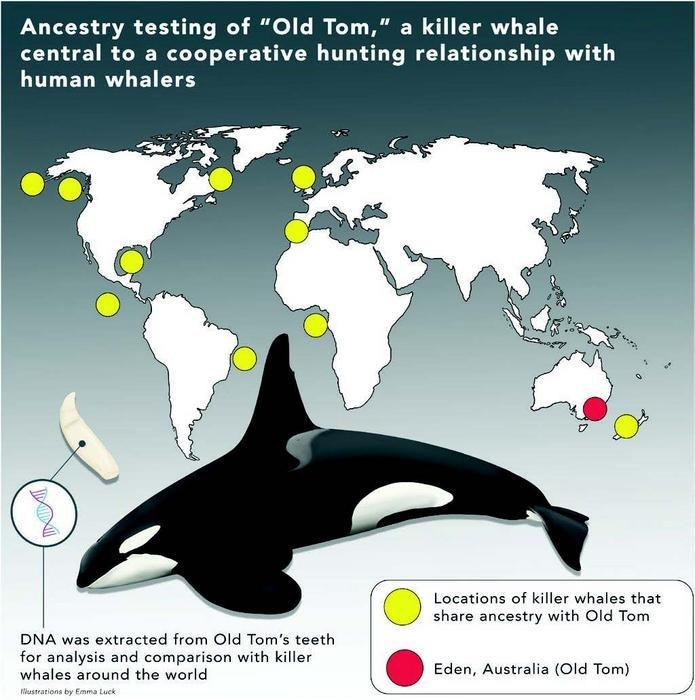Evolutionary biologists have achieved a significant milestone by unraveling the genetic ancestry of a renowned killer whale and its pod.
 Graphic depicting ancestry testing of “Old Tom,” a killer whale central to a cooperative hunting relationship with human whalers. Image Credit: Isabella Reeves at Flinders University.
Graphic depicting ancestry testing of “Old Tom,” a killer whale central to a cooperative hunting relationship with human whalers. Image Credit: Isabella Reeves at Flinders University.
In an interesting twist, the research reveals that Old Tom, the leader of the killer whale pod known for aiding whalers in hunting baleen whales in the 20th century, shares ancestral ties with contemporary killer whales in New Zealand. This discovery is the result of recent DNA research.
Old Tom's genetic lineage also reveals a shared ancestry with killer whales from Australasia, the North Pacific, and the North Atlantic Oceans. Nevertheless, the closest genetic resemblance is observed with modern New Zealand killer whales. Intriguingly, a substantial portion of Old Tom's DNA code is not present in other killer whale populations worldwide, which suggests that the killer whales in the Eden region may have faced localized extinction.
Famously known as the "Killers of Eden," Old Tom and his family played a pivotal role in assisting whalers with their hunts. In return for their aid, they were rewarded with the lips and tongues of the harvested whale carcasses, a practice referred to as the "Law of the Tongue."
The enduring and extraordinary partnership between the whalers and Old Tom's family strengthened over numerous generations of whalers. Old Tom, measuring an impressive 6.7 meters in length and weighing six tonnes, ultimately found a permanent place of honor at the Eden Killer Whale Museum after being washed ashore in 1930.
The extensive research endeavor was led by Ph.D. Candidate Isabella Reeves at Flinders University, in collaboration with the Cetacean Research Centre and a global research team. Their ambitious mission relied on the application of ancient DNA techniques to trace Old Tom's genetic lineage through DNA sequencing, comparing his DNA with killer whales from around the world.
In a notable collaborative effort with Thaua Traditional Custodian Steven Holmes, the research team has uncovered previously undocumented insights, aiming to decolonize the history of the Killers of Eden.
Isabella Reeves, the Lead Researcher, has shared that although the genetic comparisons did not identify any direct descendants of Old Tom, their research did indicate that Tom's DNA variation closely aligns with that of other killer whales. This finding suggests that the local population of killer whales, akin to Old Tom's lineage, may have become locally extinct today.
The killers of Eden represent a rare partnership between people and whales. It was an exciting journey to trace the genetic ancestry of Old Tom, in order to provide the first insights into the genetic history of this group that captured the hearts of the community and whale lovers.”
Isabella Reeves, Lead Researcher, Flinders University
Isabella Reeves adds, “Our research also delved into uncharted territory by unveiling a decolonized history. We collaborated with a Traditional Custodian, which gave us a fresh perspective on Eden’s whaling history to rectify historical inaccuracies and shed light on a crucial aspect of this unique story about the bond between their people and these whales. Importantly, we want to ensure this aspect of the story is acknowledged moving forward.”
In Twofold Bay, the Thaua people along the coast, who were part of the Yuin nation, maintained a profound connection with the killer whales through their Dreaming, a spiritual and cultural belief system. This connection was marked by deep respect and reliance, given that the Thaua people depended on the ocean for their resources.
It's important that we recognize that Indigenous Australians initiated the relationship with the killer whales before European colonization and the advent of commercial whaling locally. This study rectifies discrepancies in local records and provides new insight into the origins of the killer whales in Eden and the history of Australasian killer whales.”
Isabella Reeves, Lead Researcher, Flinders University
As affirmed by Traditional Custodian Steven Holmes, the Thaua people enjoyed an enduring companionship with the whales in Eden, with Old Tom, in particular, being a central figure in this unique and longstanding relationship.
Traditional Custodian Steven Holmes adds, “We consider beowas (killer whales) to be our brothers. Our Dreamtime stories which connect us to the beowas, is that when a Thaua member dies, they are reincarnated as a beowa. The beowas remained part of the Thaua, even after passing. The beowas would help the men by herding the other whales in the bay of Turembulerrer (Twofold Bay) for the whalers to kill. The Indigenous whalers would reward the beowas the tongue of the dead whale. This was soon known as the Law of the Tongue.”
Source:
Journal reference:
Reeves, I. M., et al. (2023) Ancestry testing of “Old Tom,” a killer whale central to mutualistic interactions with human whalers. Journal of Heredity. doi.org/10.1093/jhered/esad058.